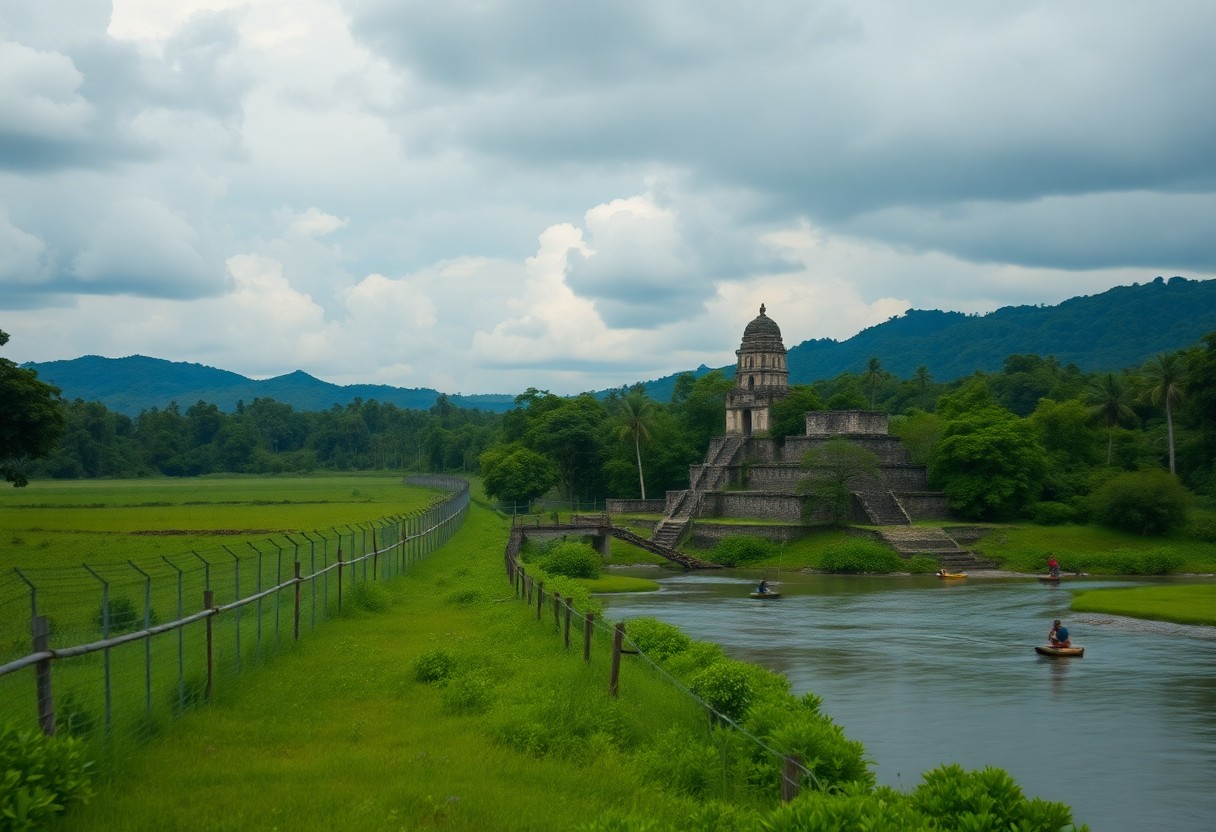The complex and deeply rooted territorial dispute between Belize and Guatemala serves as a poignant example of a long-standing geopolitical conflict that has evolved over centuries, illustrating its intricate nature. This ongoing border conflict has origins in colonial-era territorial claims and poses a significant threat to regional stability, as Guatemala has persistently contested Belize’s sovereignty since Belize gained independence. Despite decades of diplomatic friction and tension, recent developments have sparked optimism for a peaceful resolution. A notable milestone occurred in 2019 when both nations participated in a historic referendum, empowering their citizens to vote on resolving their disputes through the International Court of Justice. This initiative represents a potential breakthrough in their contentious relationship. A comprehensive understanding of the complex history surrounding this border is crucial for grasping the broader geopolitical dynamics of Central America.

Understanding the Colonial Roots of the Belize-Guatemala Dispute
The territorial disagreement between Belize and Guatemala is deeply anchored in colonial-era territorial claims, significantly shaped by the ambitious pursuits of Spanish imperialism and British colonial expansion. The roots of this dispute can be traced to the competing interests of European powers in Central America, where both nations asserted claims over strategically vital territories. The lingering unresolved boundary issues have since morphed into a persistent source of tension, illustrating the complicated historical dynamics that surround territorial sovereignty in the region. The enduring legacy of these colonial claims continues to influence the political landscape, underscoring how historical grievances can significantly impact modern diplomatic relations.
Assessing the Impact of the 1859 Boundary Treaty on Territorial Claims
Set against a backdrop of imperial negotiations, the 1859 Boundary Treaty between Britain and Guatemala aimed to delineate territorial borders, yet it inadvertently created more complications than it resolved. The treaty’s vague language and the myriad interpretations surrounding it have become a central source of ongoing territorial disputes between the two nations. The complexities inherent in this treaty underscore the lasting impact of colonial agreements on contemporary conflicts, as both Belize and Guatemala grapple with the implications of historical treaties that continue to reverberate in modern diplomatic exchanges.
Contextualizing the Historical Negotiations Over Territorial Claims
From the days of Spanish colonial authority to the formation of modern nation-states, the historical timeline showcases a convoluted landscape of territorial negotiations. The geopolitical dynamics of the region were profoundly influenced by imperial rivalries alongside the fluctuating borders of colonial territories, which laid the groundwork for future conflicts. These boundary disputes are emblematic of a deeper narrative involving colonial legacies and postcolonial territorial challenges. The strategic importance of the territory has historically incited conflicts, with Guatemala persistently contesting Belize’s sovereignty. The multifaceted nature of this dispute encompasses considerations of historical interpretation, indigenous rights, and territorial integrity, rendering it a complex international controversy that continues to shape diplomatic relations between the two nations.
Identifying the Fundamental Issues Fueling the Belize-Guatemala Border Dispute
The intricate border dispute between Belize and Guatemala weaves a rich tapestry of historical, territorial, and political dimensions. Key tensions arise from competing claims over land, sovereignty, and varying interpretations of history. This conflict, deeply rooted in colonial delineations, has been perpetuated by international legal disputes and enduring nationalist sentiments, creating substantial diplomatic challenges for both nations. Gaining a thorough understanding of these core issues is essential for addressing the complexities of the dispute and working towards a resolution that honors the interests of both countries while fostering a collaborative regional environment.
Analyzing Guatemala’s Claims Over Belizean Territory
Primarily, Guatemala asserts claims to approximately 12,000 square kilometres of Belizean territory, arguing for historical rights that originate from Spanish colonial boundaries. This assertion challenges the legitimacy of British territorial acquisitions, focusing on interpretations of historical treaties and colonial agreements that Guatemala contends were unjustly enacted. This claim reflects Guatemala’s ongoing struggle to reclaim what it views as ancestral land, highlighting the deep-seated grievances that fuel the dispute. Consequently, it emphasizes the need for a nuanced approach to resolution that acknowledges historical claims while striving for equitable solutions.
Upholding Belize’s Sovereignty and Territorial Rights
The discourse surrounding Belizean sovereignty emphasizes the nation’s right to self-determination and the safeguarding of its territorial integrity. Belize firmly asserts its independence and categorically rejects Guatemala’s territorial claims, underscoring the significance of international recognition and the legal principle of uti possidetis juris, which advocates for the retention of existing colonial boundaries post-independence. A deeper exploration reveals that Belize’s sovereignty is reinforced by international law and numerous resolutions from the United Nations. The country has consistently championed its territorial integrity, leveraging diplomatic channels and international support to strengthen its borders. Moreover, peaceful resolution strategies, including international mediation, have become essential components in addressing the prolonged dispute, demonstrating Belize’s commitment to a diplomatic resolution.

Exploring Diplomatic Initiatives to Resolve the Border Conflict
Efforts to resolve the persistent border conflict between Belize and Guatemala have encompassed a variety of international mechanisms and negotiations. Both nations acknowledge the potential risks associated with ongoing territorial tensions, prompting them to pursue peaceful resolutions through diplomatic channels. International mediation and bilateral discussions have proven instrumental in gradually alleviating historical animosities and fostering pathways toward resolution. Understanding these diplomatic initiatives can shed light on the progress achieved and the challenges that remain in attaining a lasting peace, while also highlighting the importance of collaborative approaches to conflict resolution.
Gaining Insight into the Diplomatic Negotiation Process
The diplomatic negotiations between Belize and Guatemala have been marked by incremental progress and strategic dialogue aimed at nurturing mutual understanding. These discussions have concentrated on exploring potential compromise solutions that could appease the interests of both nations. Key diplomatic initiatives have included high-level meetings, bilateral commissions, and international facilitation, all targeted at addressing territorial claims and advancing regional stability. This ongoing dialogue emphasizes the critical role of diplomacy in resolving complex geopolitical issues, demonstrating how sustained engagement can lead to constructive outcomes.
The Pivotal Role of the International Court of Justice in Mediation
The International Court of Justice (ICJ) plays an essential role in mediating the border dispute between Belize and Guatemala. The ICJ offers a neutral legal platform for addressing territorial claims, providing an internationally recognized mechanism for dispute resolution capable of potentially concluding decades of territorial tensions. The court’s involvement transcends mere arbitration; it signifies a critical turning point in Belize-Guatemala relations. By choosing to submit their dispute to the ICJ, both countries have illustrated a commitment to seeking peaceful resolution. The court’s upcoming ruling could decisively address territorial boundaries, potentially establishing a permanent legal framework for future bilateral relations and promoting regional stability.

Assessing the Effects of the Dispute on Travel and Trade Relations
Understanding the complexities of the Belize-Guatemala border necessitates a comprehensive grasp of its multifaceted challenges. The historical territorial disputes have significantly impacted cross-border interactions, shaping distinct travel and economic dynamics. The ongoing tensions have influenced transportation routes, trade patterns, and diplomatic relations between these neighboring countries. The border region demands careful consideration of geopolitical sensitivities that could affect movement and economic exchanges, making it crucial for travelers to remain informed and well-prepared regarding their travel plans.
Current Travel Recommendations for Safety and Preparedness
Traveling along the Belize-Guatemala border necessitates the exercise of heightened caution. Your safety relies on being informed about the current diplomatic climate and potential conflict zones. Official travel advisories recommend checking government websites prior to crossing, verifying documentation, and maintaining awareness of local security conditions. Careful route planning, including the use of official border crossing points, can mitigate risks and enhance your travel experience in this sensitive region, ensuring a safe and enjoyable journey.
Examining Cross-Border Trade Dynamics and Economic Interdependence
The trade relations between Belize and Guatemala at the border remain intricate and ever-evolving. Despite historical tensions, agricultural products and small-scale commercial exchanges continue to thrive, reflecting the economic interdependence that persists between these two nations. To fully comprehend these interactions, one must appreciate the resilience of economic relationships that flourish despite political challenges. The trade landscape reveals a complex network of exchanges where agricultural commodities such as sugar, citrus, and timber play pivotal roles in cross-border transactions. Informal trade networks, facilitated by local merchants, navigate the diplomatic intricacies, illustrating how economic cooperation can endure amidst territorial disputes. Ongoing bilateral agreements and diplomatic negotiations continue to influence these economic interactions, presenting promising prospects for future collaboration and mutual benefits.
Exploring the Socio-Political Consequences of the Belize-Guatemala Dispute
The border dispute between Belize and Guatemala transcends mere geographical boundaries, embodying significant socio-political implications for both nations. This territorial conflict profoundly affects diplomatic relations, national security strategies, and the broader regional landscape. Ongoing tensions create complex socio-political challenges that influence governmental strategies, international negotiations, and the daily lives of citizens in both countries. Understanding these implications is vital for grasping the broader repercussions of the dispute on the region and the associated challenges that arise.
Examining National Identity and Public Sentiment Related to the Dispute
The border dispute deeply resonates with national identity and historical narratives in both Belize and Guatemala. Each nation perceives the territorial claims as a fundamental issue of sovereignty, leading to passionate public discourse and political sentiment. This conflict has evolved into a symbol of national identity, as citizens vigorously defend their historical perspectives and territorial integrity. The emotional weight of these claims shapes public opinion, influencing political discourse and national policy, thereby highlighting the intricate relationship between territorial disputes and national identity that is keenly felt across both nations.
Evaluating Regional Stability and Security Challenges Arising from the Dispute
The ongoing border dispute presents potential vulnerabilities in regional peace and cooperation. Unresolved territorial claims generate diplomatic tensions that could destabilize bilateral relationships and affect broader regional security dynamics. Recognizing these challenges is crucial for understanding the complex geopolitical landscape of Central America. The dispute signifies more than a mere territorial disagreement; it threatens regional stability through the potential for military escalations. The persistent tension complicates economic cooperation, cross-border trade, and collaborative security efforts. Awareness of these dynamics clarifies how unresolved territorial claims can undermine diplomatic progress and create long-term challenges for peaceful coexistence between Belize and Guatemala.
Imagining Future Solutions for Resolving the Dispute
Despite the intricate historical tensions, the situation along the Belize-Guatemala border reveals potential pathways for diplomatic resolution. Ongoing negotiations and international mediation offer the promise of achieving a peaceful settlement. The international community maintains a supportive stance toward constructive dialogue between both nations, indicating that a comprehensive resolution may be achievable in the coming years. The commitment to diplomacy represents a crucial step toward addressing longstanding grievances and nurturing a more stable future for both countries and their citizens.
Exploring Possible Resolutions to the Dispute
Resolutions to the enduring territorial dispute could entail international arbitration or a mutually agreed-upon territorial compromise. Recent indications of both countries’ willingness to engage in diplomatic discussions suggest that a mutually beneficial agreement may be on the horizon. The involvement of neutral international entities could provide a structured framework for resolving historical claims, paving the way for more effective conflict resolution strategies that respect the sovereignty of both nations.
The Influence of International Relations on Shaping Border Negotiations
International relations play a significant role in the border negotiations between Belize and Guatemala. Diplomatic channels have emerged as essential tools for managing territorial tensions and promoting dialogue. Regional organizations and global diplomatic platforms continue to be pivotal in facilitating discussions and seeking peaceful resolutions. Additionally, the broader geopolitical context profoundly influences these border relations, as international pressure and diplomatic engagement create opportunities for resolution. The potential for economic cooperation, joint development projects, and shared security interests presents promising avenues for collaboration. Organizations such as the OAS have played an instrumental role in mediating discussions and encouraging peaceful interactions between the two nations.
Frequently Asked Questions About the Belize-Guatemala Territorial Dispute
What historical factors contributed to the territorial dispute between Belize and Guatemala?
The territorial dispute originated from Spanish colonial claims and British settlements in the region during the 19th century. Initially, Spain claimed the territory; however, Britain established settlements in Belize, leading to intricate legal and territorial challenges. The conflict centers on competing territorial assertions, with Guatemala upholding claims to a significant portion of Belize’s land following Central American independence in 1821, creating a contentious historical backdrop.
How has the international community facilitated the resolution of the long-standing border conflict?
The Organization of American States (OAS) has played a crucial mediation role. In 2008, both countries consented to submit the dispute to the International Court of Justice (ICJ) for a binding resolution. A referendum held in both Belize and Guatemala during 2018-2019 demonstrated public support for international judicial intervention, ultimately laying the groundwork for a peaceful resolution mechanism and reinforcing the importance of international cooperation.
What is the current status of the Belize-Guatemala border agreement?
In May 2019, the ICJ delivered a definitive ruling on the territorial dispute, largely affirming Belize’s sovereignty while making minor adjustments to the border demarcation. The ruling granted Belize approximately 12,272 square kilometres of territory, establishing a clear legal framework for future diplomatic relations and defining permanent maritime and land boundaries between the two nations, thereby enhancing regional stability.
The Article The Belize-Guatemala Border: History, Conflict, and Current Status appeared first on Belize Travel Guide
The Article Belize-Guatemala Border: Historical Conflicts and Current Status Was Found On https://limitsofstrategy.com
The Article Belize-Guatemala Border: Current Status and Historical Conflicts First Appeared ON
: https://ad4sc.com
Comments are closed